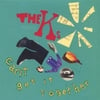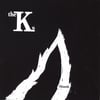Holy crap this is a good book. It’s amazing, start to finish. It’s over: the end. It ends before it even begins. Then, Phoenix, it rises from the flames. Some say (and when some say “some say” they don’t mean someone, they mean no one. “Some” means “none” means the straw man means some asshole means “Look at this argument some asshole made! I’m going to tear this asshole a new asshole!” Assholes tearing assholes, babies making babies.”) you should say “Phoenix from the ashes,” as that’s the true myth, (true myth!) but some people and not just some people but one person, Boudleaux Bryan, would say that when love hurts love is like a stove, it burns you when it’s hot, but Nazareth would say love is like a flame it burns you when it’s hot, and some people would say what the fuck does that mean, of course flame burns, when is a flame not hot (oh we shall see! We shall feel!) it’s got to be a stove, something that can get hot and burn, but other people, particularly this person, who is the narrator (and yes, I am a motherfucking omniscient narrator, so I am speaking with the voice of God, so how can I be wrong?) would say, yes, but is “stove” a word that rocks? Can you really stick a big lump of cast iron onto the delicate threads of beautiful song and not have it pull them til they stretch and snap? Is love, burning fire that it is, really a kitchen appliance? Rock music burns and therefore you can add fire anywhere, whether it makes any damned sense or not. Likewise, Phoenix from the flame, because we’re not waiting for the ashes, we’re borning again right now, and besides have you never learned that alliteration is truth? Anyway, it’s a great book. Wait til you read it.
Keep waiting. Wait for it, wait for it….Wait forever. It never begins, because first you have to live for eternity, in a fire that is cold and then gets hot (See? Feel?) and burns forever. The iron ball in the sky is brushed by a pigeon every thousand years (Some might say million, but you cannot know a million, only a thousand thousands.) until it is worn away to nothing, and then eternity has just begun. Don’t crack this book’s spine until your spine is scattered like dice in the dust and then the dust, and then glass and then broken glass ground down into powder and that powder turns to silt in a riverbed turned to mud turned to man turns to all mankind born and died until the last man, last spine, last pile of sand, glass, dust until there are no riverbeds and there is no dirt only fire in the flame that burns you when it’s hot but then it cools and cools until the flame is frozen, only then should you gaze upon the page you are now reading. I probably should have given you some advance warning.
If you’ve ignored the warning that was never given (the most important of warnings to heed) then you are hungrily eating a forbidden fruit that you should have waited to bite. (If only Adam and Eve had not been forbidden the fruit! If only they’d been told to wait, just wait for the fruit, albeit forever, maybe they could have waited, and then we wouldn’t be doomed from birth and ages before birth to eternal punishment for a crime we did not commit, praying before we even learned to speak or even learned to be, for The Lord’s forgiveness and the Church’s holy wash-tub to soak us free of those first hungry sinner’s heartburn. They probably wouldn’t have waited, either. No one likes to wait.) You should have waited, for our hero, who is hardly a hero, hardly a protagonist and hardly a man, more a morsel of sin than a person before he begins again, he had to wait, wait forever, frozen in fire, waiting without waiting, for he’d long ago lost all expectation, except for the expectation of more eternity passing in infinite slowness, and the expectation of extreme pain.
For this is the story of the one man to escape from hell.
--Dan Kilian
Subscribe to:
Post Comments (Atom)





No comments:
Post a Comment